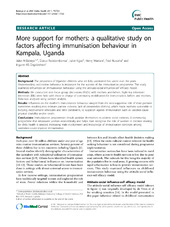| dc.contributor.author | Babirye, Juliet N. | en_US |
| dc.contributor.author | Rutebemberwa, Elizeus | en_US |
| dc.contributor.author | Kiguli, Juliet | en_US |
| dc.contributor.author | Wamani, Henry | en_US |
| dc.contributor.author | Nuwaha, Fred | en_US |
| dc.contributor.author | Engebretsen, Ingunn Marie S. | en_US |
| dc.date.accessioned | 2011-12-09T10:20:44Z | |
| dc.date.available | 2011-12-09T10:20:44Z | |
| dc.date.issued | 2011-09-25 | eng |
| dc.Published | BMC Public Health 2011, 11:723 | en |
| dc.identifier.issn | 1471-2458 | |
| dc.identifier.uri | https://hdl.handle.net/1956/5270 | |
| dc.description.abstract | Background: The proportion of Ugandan children who are fully vaccinated has varied over the years. Understanding vaccination behaviour is important for the success of the immunisation programme. This study examined influences on immunisation behaviour using the attitude-social influence-self efficacy model. Methods: We conducted nine focus group discussions (FGDs) with mothers and fathers. Eight key informant interviews (KIIs) were held with those in charge of community mobilisation for immunisation, fathers and mothers. Data was analysed using content analysis. Results: Influences on the mother’s immunisation behaviour ranged from the non-supportive role of male partners sometimes resulting into intimate partner violence, lack of presentable clothing which made mothers vulnerable to bullying, inconvenient schedules and time constraints, to suspicion against immunisation such as vaccines cause physical disability and/or death. Conclusions: Immunisation programmes should position themselves to address social contexts. A community programme that empowers women economically and helps men recognise the role of women in decision making for child health is needed. Increasing male involvement and knowledge of immunisation concepts among caretakers could improve immunisation. | en_US |
| dc.language.iso | eng | eng |
| dc.publisher | BioMed Central | eng |
| dc.rights | Attribution CC BY | eng |
| dc.rights.uri | http://creativecommons.org/licenses/by/2.0/ | eng |
| dc.subject | Immunisation behaviour | eng |
| dc.title | More support for mothers: a qualitative study on factors affecting immunisation behaviour in Kampala, Uganda | en_US |
| dc.type | Peer reviewed | |
| dc.type | Journal article | |
| dc.description.version | publishedVersion | en_US |
| dc.rights.holder | Copyright 2011 Babirye et al; licensee BioMed Central Ltd. | |
| dc.identifier.doi | https://doi.org/10.1186/1471-2458-11-723 | |
| dc.identifier.cristin | 884141 | |
| dc.subject.nsi | VDP::Medical disciplines: 700::Health sciences: 800::Community medicine, Social medicine: 801 | eng |

